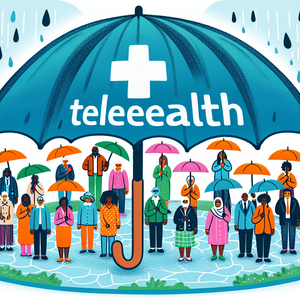The Future of Family Healthcare: Remote Practitioners in Rural Areas

Rural areas often face significant healthcare disparities due to a shortage of healthcare professionals. According to the Health Resources and Services Administration (HRSA), rural populations are more likely to experience higher rates of chronic diseases, limited access to specialists, and longer travel times for medical care. For instance, the HRSA estimates that nearly 20% of rural Americans live in a Health Professional Shortage Area (HPSA), leading to a pressing need for innovative solutions that can deliver high-quality care directly to patients' homes. Challenges such as these create a healthcare landscape where preventive care and timely interventions are often sidelined, resulting in poorer health outcomes. In rural settings, patients may delay seeking care due to the burden of travel, leading to advanced conditions that require more intensive treatment.
Remote Family Nurse Practitioners: A Solution
Remote family nurse practitioners have emerged as a critical resource in addressing these challenges. By leveraging technology, FNPs can provide consultations, follow-up care, and health education to patients in rural settings without the need for extensive travel. Telehealth services have made it possible for FNPs to connect with patients via video calls, phone consultations, and secure messaging, ensuring continuity of care regardless of location. As telehealth becomes increasingly integrated into healthcare systems, remote FNP jobs are on the rise, reflecting a growing recognition of their role in delivering care. According to a report from the American Association of Nurse Practitioners (AANP), the number of nurse practitioners practicing in telehealth roles has doubled in recent years, highlighting the increasing reliance on these professionals in underserved areas.
Enhancing Patient Outcomes
The integration of remote FNPs into rural healthcare systems has shown promising results. A study published in the Journal of Telemedicine and Telecare found that telehealth services led to improved management of chronic conditions, such as diabetes and hypertension, in rural patients. Remote monitoring tools and mobile health applications empower patients to take charge of their health, providing FNPs with real-time data to inform treatment plans. For instance, an FNP working with a rural population might utilize wearable devices that track patient vitals, allowing for timely interventions and reducing the need for emergency visits. This proactive approach not only enhances patient outcomes but also helps alleviate the burden on local healthcare facilities. A case study in a rural community demonstrated that patients monitored remotely by FNPs reduced their hospital readmission rates by over 30%, underscoring the effectiveness of remote care strategies.
Building Relationships in a Virtual World
One of the primary concerns surrounding remote healthcare is the potential for a lack of personal connection between practitioners and patients. However, many FNPs are finding innovative ways to build rapport and trust, even in a virtual environment. Regular check-ins, personalized care plans, and the use of patient portals for communication can help foster strong practitioner-patient relationships. Moreover, remote FNPs often engage with their communities through educational webinars, online health workshops, and social media platforms, creating a sense of community and support among patients. These initiatives help to combat feelings of isolation that patients in rural areas may experience, making healthcare feel more accessible and approachable. For example, an FNP may host a monthly wellness webinar discussing common health concerns in the community, encouraging participation and fostering a sense of belonging.
Challenges and Considerations
While the benefits of remote family nurse practitioners are clear, there are challenges that must be addressed. Issues such as technology access, internet connectivity, and digital literacy can hinder the effectiveness of telehealth services in rural populations. According to a 2022 survey by the Pew Research Center, nearly 25% of rural Americans report that they do not have reliable internet access, which poses a significant barrier to telehealth adoption. Additionally, reimbursement policies for telehealth vary widely, impacting the sustainability of remote FNP services. Many insurance providers have yet to establish equitable reimbursement rates for telehealth visits, creating financial uncertainty for practitioners and patients alike. To overcome these obstacles, collaboration among healthcare providers, policymakers, and technology companies is essential. Efforts to improve broadband access in rural areas, along with advocacy for equitable reimbursement policies, are critical to ensuring that remote FNPs can continue to thrive and serve their communities effectively.
The future of family healthcare in rural areas is bright, thanks in large part to the emergence of remote family nurse practitioners. By extending their reach through telemedicine, FNPs are not only bridging the healthcare gap but also redefining what it means to provide patient-centered care. As we continue to embrace technological advancements and work toward overcoming existing barriers, the potential for improved health outcomes in rural communities becomes increasingly attainable. In this evolving landscape, remote FNPs stand as vital agents of change, ensuring that quality healthcare is accessible to all, regardless of their location. With the right support and resources, remote family nurse practitioners can lead the way toward a more equitable healthcare system for rural populations.
Telehealth Nurse Practitioner
Large healthcare systems, telehealth companies like Teladoc and Amwell
Core Responsibilities
Conduct virtual patient assessments and create individualized care plans.
Manage chronic conditions through telehealth technology and follow-up consultations.
Educate patients on health management, including medication adherence and lifestyle changes.
Required Skills
Proficient in telehealth platforms and remote monitoring tools.
Strong communication skills to effectively engage with patients virtually.
Experience in family medicine or primary care.
Health Informatics Specialist
Hospitals, health IT firms, research institutions
Core Responsibilities
Analyze and manage health data to improve patient care and outcomes.
Collaborate with healthcare providers to optimize electronic health record (EHR) systems.
Develop and implement data-driven strategies for telehealth services.
Required Skills
Expertise in health information systems and data analytics.
Knowledge of regulatory requirements related to patient data privacy (e.g., HIPAA).
Strong problem-solving skills and attention to detail.
Remote Patient Monitoring Coordinator
Telehealth companies, outpatient care centers, health insurance firms
Core Responsibilities
Oversee the deployment of remote monitoring devices for chronic disease management.
Analyze patient data to identify trends and recommend interventions.
Collaborate with healthcare teams to ensure coordinated care delivery.
Required Skills
Familiarity with wearable health technology and data interpretation.
Excellent organizational and communication skills for patient interaction.
Background in nursing or healthcare administration preferred.
Community Health Educator
Nonprofit organizations, public health departments, healthcare systems
Core Responsibilities
Design and implement health education programs tailored to rural populations.
Facilitate workshops and webinars on disease prevention and wellness strategies.
Assess community health needs and advocate for resources and services.
Required Skills
Strong public speaking and interpersonal skills.
Ability to analyze community health data and apply findings to program development.
Experience in public health or community outreach initiatives.
Rural Health Policy Analyst
Government agencies, think tanks, advocacy organizations
Core Responsibilities
Research and analyze policies affecting healthcare access and delivery in rural areas.
Collaborate with stakeholders to propose changes to telehealth reimbursement and regulations.
Advocate for policy initiatives that improve healthcare equity in underserved communities.
Required Skills
Strong analytical skills and experience in policy development.
Understanding of healthcare economics and rural health issues.
Excellent written and verbal communication skills for reporting findings.


